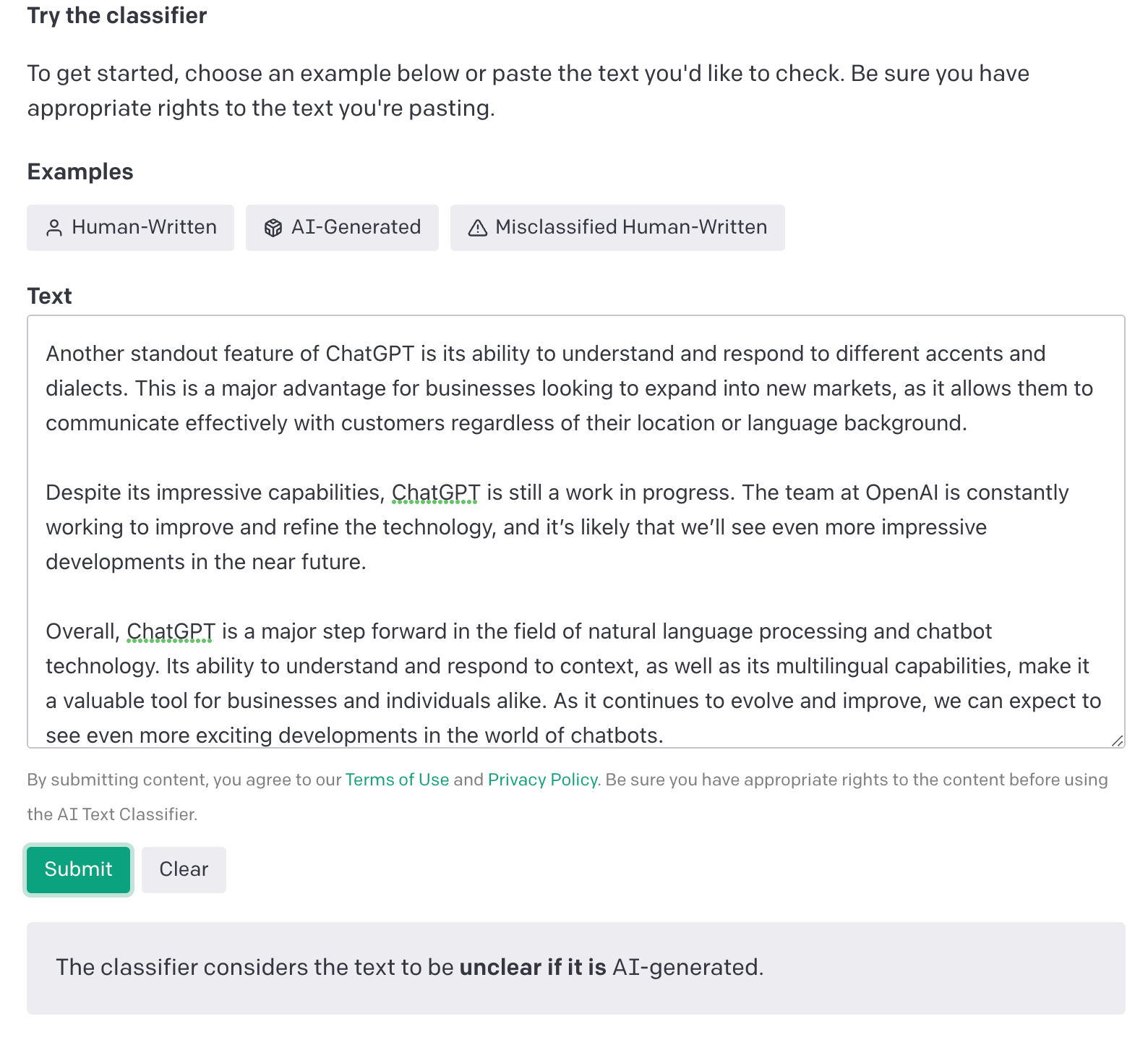After telegraphing the move in media appearances, OpenAI has launched a tool that attempts to distinguish between human-written and AI-generated text — like the text produced by the company’s own ChatGPT and GPT-3 models. The classifier isn’t particularly accurate — its success rate is around 26%, OpenAI notes — but OpenAI argues that it, when used in tandem with other methods, could be useful in helping prevent AI text generators from being abused.
As the fervor around generative AI — particularly text-generating AI — grows, critics have called on the creators of these tools to take steps to mitigate their potentially harmful effects. Some of the U.S.’ largest school districts have banned ChatGPT on their networks and devices, fearing the impacts on student learning and the accuracy of the content that the tool produces. And sites including Stack Overflow have banned users from sharing content generated by ChatGPT, saying that the AI makes it too easy for users to flood discussion threads with dubious answers.
OpenAI’s classifier — aptly called OpenAI AI Text Classifier — is intriguing architecturally. It, like ChatGPT, is an AI language model trained on many, many examples of publicly available text from the web. But unlike ChatGPT, it’s fine-tuned to predict how likely it is that a piece of text was generated by AI — not just from ChatGPT, but any text-generating AI model.
More specifically, OpenAI trained the OpenAI AI Text Classifier on text from 34 text-generating systems from five different organizations, including OpenAI itself. This text was paired with similar (but not exactly similar) human-written text from Wikipedia, websites extracted from links shared on Reddit and a set of “human demonstrations” collected for a previous OpenAI text-generating system. (OpenAI admits in a support document, however, that it might’ve inadvertently misclassified some AI-written text as human-written “given the proliferation of AI-generated content on the internet.”)
The OpenAI Text Classifier won’t work on just any text, importantly. It needs a minimum of 1,000 characters, or about 150 to 250 words. It doesn’t detect plagiarism — an especially unfortunate limitation considering that text-generating AI has been shown to regurgitate the text on which it was trained. And OpenAI says that it’s more likely to get things wrong on text written by children or in a language other than English, owing to its English-forward dataset.
The detector hedges its answer a bit when evaluating whether a given piece of text is AI-generated. Depending on its confidence level, it’ll label text as “very unlikely” AI-generated (less than a 10% chance), “unlikely” AI-generated (between a 10% and 45% chance), “unclear if it is” AI-generated (a 45% to 90% chance), “possibly” AI-generated (a 90% to 98% chance) or “likely” AI-generated (an over 98% chance).
Out of curiosity, I fed some text through the classifier to see how it might manage. While it confidently, correctly predicted that several paragraphs from a TechCrunch article about Meta’s Horizon Worlds and a snippet from an OpenAI support page weren’t AI generated, the classifier had a tougher time with article-length text from ChatGPT, ultimately failing to classify it altogether. It did, however, successfully spot ChatGPT output from a Gizmodo piece about — what else? — ChatGPT.
According to OpenAI, the classifier incorrectly labels human-written text as AI-written 9% of the time. This mistake didn’t occur in my testing, but I chalk that up to the small sample size.

On a practical level, I found the classifier not particularly useful for evaluating shorter pieces of writing. Indeed, 1,000 characters is a difficult threshold to reach in the realm of messages, for example emails (at least the ones I get on a regular basis). And the limitations give pause — OpenAI emphasizes that the classifier can be evaded by modifying some words or clauses in generated text.
That’s not to suggest the classifier is useless — far from it. But it certainly won’t stop committed fraudsters (or students, for that matter) in its current state.
The question is, will other tools? Something of a cottage industry has sprung up to meet the demand for AI-generated text detectors. ChatZero, developed by a Princeton University student, uses criteria including “perplexity” (the complexity of text) and “burstiness” (the variations of sentences) to detect whether text might be AI-written. Plagiarism detector Turnitin is developing its own AI-generated text detector. Beyond those, a Google search yields at least a half-dozen other apps that claim to be able to separate the AI-generated wheat from the human-generated chaff, to torture the metaphor.
It’ll likely become a cat-and-mouse game. As text-generating AI improves, so will the detectors — a never-ending back-and-forth similar to that between cybercriminals and security researchers. And as OpenAI writes, while the classifiers might help in certain circumstances, they’ll never be a reliable sole piece of evidence in deciding whether text was AI-generated.
That’s all to say that there’s no silver bullet to solve the problems AI-generated text poses. Quite likely, there won’t ever be.































Comment